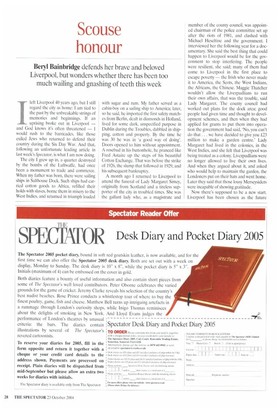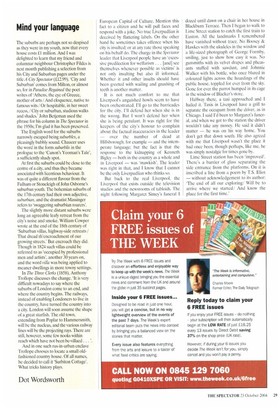Scouse honour
Beryl Bainbridge defends her brave and beloved Liverpool, but wonders whether there has been too much wailing and gnashing of teeth this week
Ileft Liverpool 4.0 years ago, but I still regard the city as home: I am tied to the past by the unbreakable strings of memories and beginnings. If an
uprising broke out in Liverpool — and God knows it's often threatened — I would rush to the barricades, like those exiled Jews who returned to defend their country during the Six Day War. And that, following an unfortunate leading article in last week's Spectator, is what 1 am now doing.
The city I grew up in, a quarter destroyed by the bombs of the Luftwaffe, had once been a monument to trade and commerce. When my father was born, there were sailing ships in Salthouse Dock. Such ships had carried cotton goods to Africa, refilled their holds with slaves, borne them in misery to the West Indies, and returned in triumph loaded with sugar and rum. My father served as a cabin-boy on a sailing ship to America; later, so he said, he imported the first safety matches from Berlin, dealt in diamonds in Holland, lived for some dark, unspecified purpose in Dublin during the Troubles, dabbled in shipping, cotton and property. By the time he was 30 he was in 'a good way of doing'. Doors opened to him without appointment. A rosebud in his buttonhole, he pranced like Fred Astaire up the steps of his beautiful Cotton Exchange. That was before the strike of 1926, the slump that followed in 1929, and his subsequent bankruptcy.
A month ago I returned to Liverpool to attend the funeral of Lady Margaret Simey, originally from Scotland and a tireless supporter of the city in troubled times. She was the gallant lady who, as a magistrate and member of the county council, was appointed chairman of the police committee set up after the riots of 1981, and clashed with Michael Heseltine and the government. I interviewed her the following year for a documentary. She said the best thing that could happen to Liverpool would be for the government to stop interfering. The people were resilient, she said; many of them had come to Liverpool in the first place to escape poverty — the Irish who never made it to America, the Scots, the West Indians, the Africans, the Chinese. Maggie Thatcher wouldn't allow the Liverpudlians to run their own affairs, that was the trouble, said Lady Margaret. The county council had worked out plans for the dock area; good people had given time and thought to development schemes, and then when they had applied for grants to put them into operation the government had said, 'No, you can't do that. . . we have decided to give you £23 million to make a garden centre.' Lady Margaret had lived in the colonies, in the West Indies, and she felt that Liverpool was being treated as a colony. Liverpudlians were no longer allowed to live their own lives. And when they argued about it, and asked who would help to maintain the garden, the Londoners put on their hats and went home. Later they said that those lousy Merseysiders were incapable of showing gratitude.
Now there's supposed to be a new start. Liverpool has been chosen as the future European Capital of Culture. Mention this fact to a citizen and he will pull faces and respond with a joke. No true Liverpudlian is deceived by flattering labels. On the other hand he sometimes takes offence when his city is insulted; or at any rate those speaking on his behalf do. The charge in the Spectator leader that Liverpool people have an 'excessive predilection for welfarism . . . [and] see themselves whenever possible as victims' is not only insulting but also ill informed. Whether it and other insults should have been greeted with wailing and gnashing of teeth is another matter.
It is not much comfort to me that Liverpool's anguished howls seem to have been orchestrated. I'll go to the barricades for the city. I'll defend her when she is in the wrong. But I won't defend her when she is being petulant. It was right for the keepers of the city's honour to complain about the factual inaccuracies in the leader — over the number of dead at Hillsborough, for example — and the intemperate language; but the fact is that the response to the kidnapping of Kenneth Bigley — both in the country as a whole and in Liverpool — was 'mawkish'. The leader was right in that, and I know that I cannot be the only Liverpudlian who thinks so.
But back to the real Liverpool, the Liverpool that exists outside the television studios and the newsrooms of tabloids. The night following Margaret Simey's funeral I dozed until dawn on a chair in her house in Blackburn Terrace. Then I began to walk to Lime Street station to catch the first train to Euston. All the landmarks I remembered have vanished without trace. No 13oosey & Hawkes with the ukuleles in the window and a life-sized photograph of George Formby, smiling, just to show how easy it was. No gunsmiths with its velvet drapes and pheasants stuffed with sawdust, and Johnnie Walker with his bottle, who once blazed in coloured lights across the hoardings of the public house, toppled for ever from the sky. Gone for ever the parrot humped in its cage in the window of Blacker's store.
Halfway there, a taxi approached and I hailed it. Taxis in Liverpool have a grill to separate the occupant from the driver, as in Chicago. I said I'd been to Margaret's funeral, and when we got to the station the driver wouldn't take any money. He said it didn't matter — he was on his way home. You don't get that down south. Ile also agreed with me that Liverpool wasn't the place it had once been, though perhaps, like me, he was simply nostalgic for times gone by.
Lime Street station has been 'improved'. There's a barrier of glass separating the side entrance from the platforms. On it is inscribed a line from a poem by T.S. Eliot — without acknowledgement to its author: 'The end of all our exploring/ Will be to arrive where we started/ And know the place for the first time.'

























































































 Previous page
Previous page